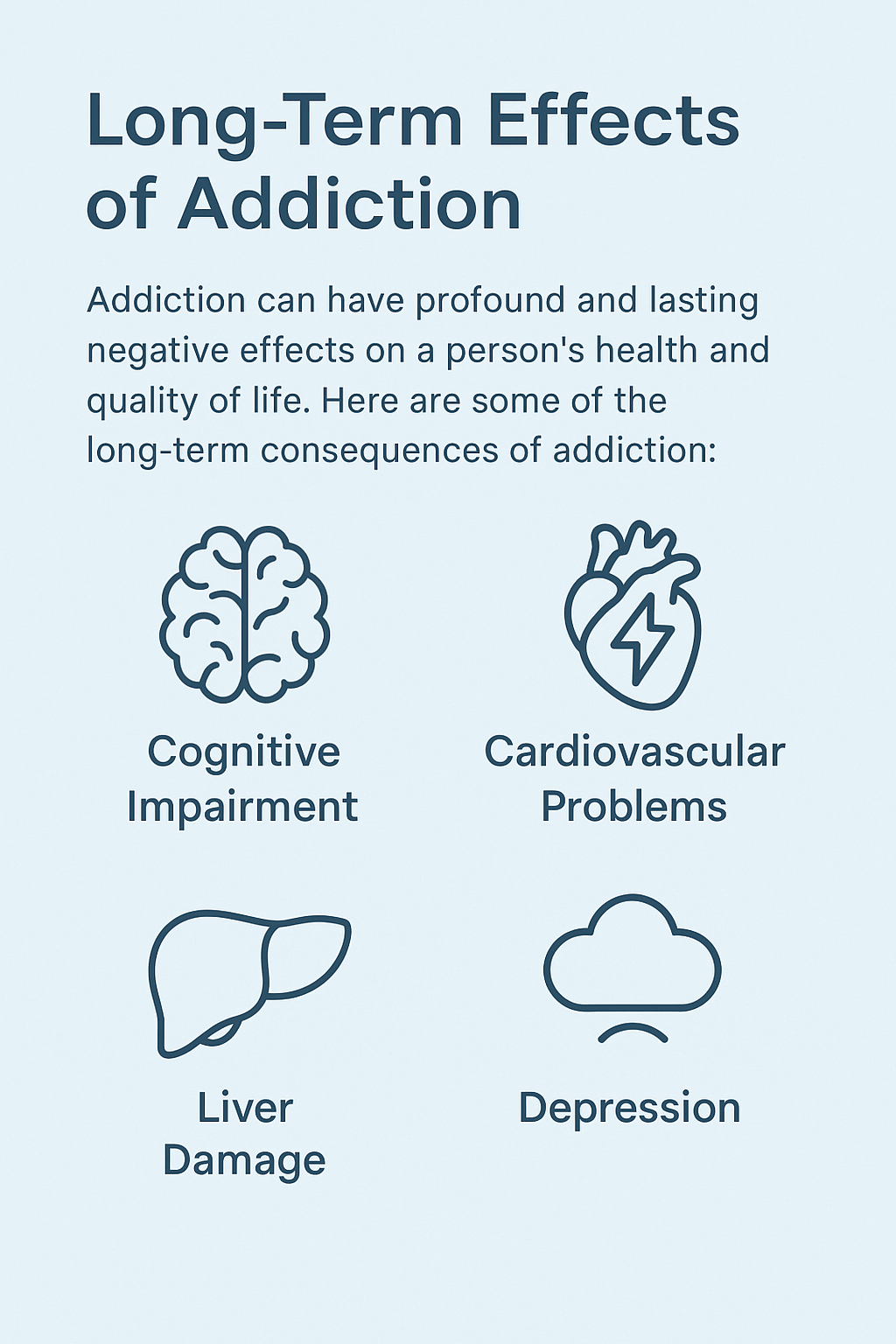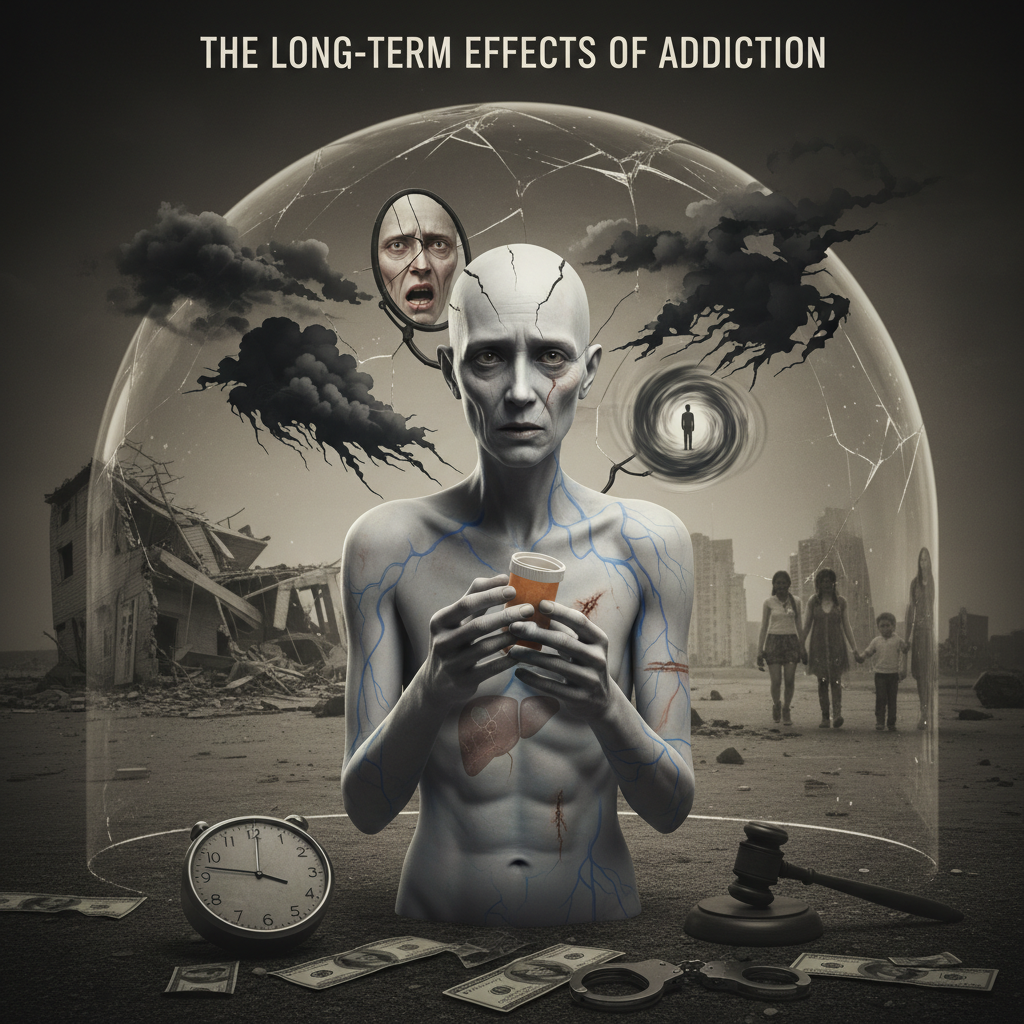Addiction can quietly reshape nearly every part of a person’s life, often in ways that aren’t immediately obvious. Even after the substance use stops, its effects can linger—emotionally, mentally, socially, and physically. Over time, addiction can erode self-esteem, strain relationships, and alter how a person experiences joy, motivation, and trust. It can change the brain’s reward system, making it harder to find satisfaction in everyday life, while also taking a toll on the body through damage to the heart, liver, or neurological system. Beyond the physical and emotional cost, addiction often isolates people, creating a cycle of guilt, shame, and loneliness that can make recovery feel even harder to sustain. This guide delves into these long-term effects in depth, helping you understand why early intervention is crucial and how ongoing support—both personal and professional—can facilitate a lasting recovery.
The Lasting Impact Addiction Has on the Body and Mind
Addiction isn’t a fleeting issue; it can leave a mark on both your physical health and how you process life. Some of these changes can linger for years, and even in recovery, reminders may occasionally resurface. Here’s how addiction can affect the body and mind in the long haul.
Many substances (like alcohol, opioids, meth, or nicotine) seriously wear down vital organs. Long-term alcohol misuse can harm the liver, heart, or pancreas. Opioids affect the brain’s ability to regulate pain or mood. Even after quitting, people face increased risk for things like high blood pressure or stroke. I’ve talked with folks years after they stopped using who still deal with sleep issues or memory fog. This illustrates the persistence of these changes.
The brain is another big area where addiction’s effects turn up. Many substances actually alter how your brain sends signals, making it difficult to feel happy or motivated on a day-to-day basis. For some, anxiety, depression, or focus issues linger for years. Rebuilding is possible—it just takes time, patience, and steady encouragement.
- Brain Function: Memory trouble, reduced ability to make decisions, or concentration issues often persist even after recovery begins.
- Mood Disorders: Anxiety or depression often linger, especially if those issues were present before the addiction.
- Physical Health Problems: Chronic illnesses, a weakened immune system, and persistent issues with organs such as the heart or kidneys may occur.
It’s essential to note that the effects may manifest differently for each individual. Age, genetics, and the substance a person was using all play a role. Seeking medical advice and sticking to regular check-ups can help manage these challenges. Over time, most people notice improvements; however, patience and consistency are crucial during this stage of recovery.
Addiction’s Ripple Effect on Relationships and Social Life
The effects of addiction stretch much further than the individual—it touches family, friendships, and even employment. From what I’ve seen, fixing broken trust and repairing relationships is often just as tricky as fighting the addiction itself.
When someone is caught up in addiction, it’s pretty standard for their social circle to shrink. Some push others away to hide their use, while old friends might back off out of uncertainty. Years of this can leave a real sense of loneliness that’s tough to shake, even after recovery begins.
At work or school, addiction can mean frequent absences, missed deadlines, or falling performance. The longer it lasts, the harder it is to get back on track. Sometimes, years on, people are still repairing gaps in their resume or trying to regain trust from coworkers and managers.
- Family Problems: Arguments, broken trust, and additional financial strain can sometimes split family members apart and make it difficult to reconnect later.
- Isolation: Many individuals lose friendships and supportive networks, which can exacerbate loneliness and hinder recovery.
- Work and Education Challenges: Missing work or school and struggling to focus can have a profound impact on careers or academic progress for years.
It’s possible, though, to mend these connections. It typically requires honest apologies, patience from both parties, and ongoing communication. Some families attend support groups together, which can really help everyone heal and understand each other.
Financial and Legal Consequences That Linger
Addiction can cause financial surprises that don’t disappear when substance use ends. I’ve known people who face legal troubles or overwhelming debt long after their recovery began. These problems can persist if not addressed directly.
It’s common for people to empty savings accounts or rack up credit card debt to pay for substances. This can lead to mounting debt, unpaid bills, and even bankruptcy. Handling these is often part of recovery since money worries can trigger a relapse for many.
Legal problems also enter the picture. Some face fines, probation, or criminal records that limit job and housing options. Scraping clean a legal record takes patience, support, and sometimes help from experts.
- Debt: Ongoing bills, collection calls, and trouble getting credit follow many people, especially after long stretches of addiction.
- Legal Trouble: Arrests connected to substance use, driving offenses, or custody issues can leave long-lasting marks in a person’s life.
- Limited Opportunities: Criminal records and gaps in work experience slow down progress toward stable jobs or housing.
Seeking financial counseling or legal advice can help accelerate the recovery process. There’s no shame in reaching for assistance—many programs exist specifically to give a boost to those coming out of addiction.
What Recovery Really Means Over the Years
Recovery looks different for everyone, but something I’ve noticed is that it doesn’t have a finish line. The long-term effects of addiction mean staying healthy is all about small steps and steady adjustments as time goes on.
Support groups, therapy, and adhering to consistent routines are helpful. Many people find that recovery helps them reconnect with their family or discover new hobbies that fuel their motivation. The ride isn’t always smooth; old cravings or habits can swing back during times of stress. Keeping expectations grounded and celebrating small achievements keeps people moving forward.
- Structure and Support: Most people thrive with ongoing counseling, peer support, and consistent routines that foster new, healthy habits.
- Relapse Prevention: Triggers can pop up, sometimes years after quitting. Knowing the signs and building a safety net make a huge difference.
- Physical and Mental Health: Regular medical checkups and mental health care are crucial for sustaining recovery.
Lifelong Learning and Coping Strategies
From people in long-term recovery, I’ve learned that learning never stops—about self, about stress management, and about bouncing back from setbacks. Some keep journals to track feelings or setbacks, some develop new interests, and others support new folks in recovery. These efforts fill the gaps addiction leaves behind, giving life new purpose.
Common Hurdles You Might Face
Hitting roadblocks in recovery is normal. Feeling low, wrestling with restlessness, or doubting your path—all of this is completely common. Here are a few sticking points people often run into, with ideas to work through them:
- Coping with Triggers: Certain places, people, or even songs can trigger cravings. Finding distractions or trusted support can help get over those moments.
- Dealing With Guilt and Shame: Many carry guilt or shame from things done during addiction. Working towards self-forgiveness is a crucial part of the healing process.
- Health Setbacks: Physical health issues may persist or resurface unexpectedly. Keeping appointments with health professionals and staying proactive catches problems early.
Having systems in place for these situations, such as a plan for who to call when cravings hit, can make the process smoother and prevent setbacks from turning into full relapses. Remember, progress is often non-linear and requires both self-compassion and outside support.
Small Steps That Make a Big Difference
Keeping routines manageable, learning to ask for help, and accepting setbacks as part of the ride all matter. Many people discover new energy by helping others in the recovery community or volunteering, which boosts both their spirits and a sense of purpose.
Frequently Asked Questions
Being open about the long-term effects of addiction helps clear up confusion. Here are some questions I hear regularly, plus answers based on both personal experience and research.
Question: Can someone ever fully recover from the effects of addiction?
Answer: Recovery is entirely possible, and people can regain a significant amount of what was lost. However, some physical or mental effects may linger for years. Building a solid support system and healthy routines can have a lasting impact on well-being.
Question: How can families support a loved one facing long-term effects?
Answer: Family members can help the most by being patient, learning more about addiction, and encouraging healthy lifestyle changes. Open conversation and setting clear boundaries can make a real difference.
Question: What are the best ways to manage ongoing cravings?
Answer: People usually benefit from having a plan—like staying active, using mindfulness, or reaching out to trusted friends or groups. Therapy or counseling can also be very helpful in managing triggers.
Looking Forward After Addiction
Living with the long-term effects of addiction means looking for new ways to move ahead, heal, and stay hopeful. While some changes stick, plenty of people stumble upon strengths and new supports they never expected. Staying proactive about health—both mentally and physically—by reaching out for support and focusing on achievable goals can turn recovery into an enriching process. This ride is about more than just sidestepping relapse; it’s about making a better, more fulfilling future one day at a time.
Video: How Addiction Changes Your Body Forever

